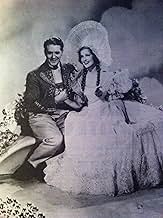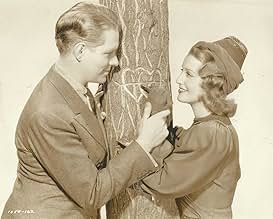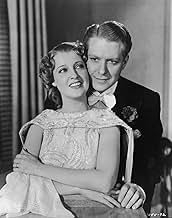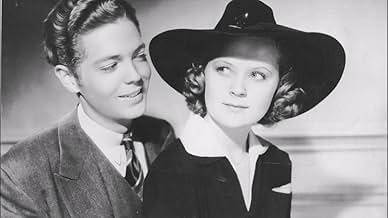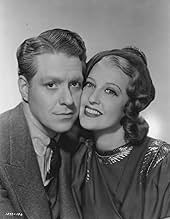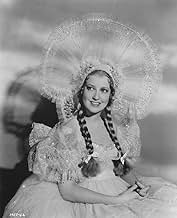अपनी भाषा में प्लॉट जोड़ेंThe team behind a successful Broadway production tries to stop the married stars from transitioning to Hollywood.The team behind a successful Broadway production tries to stop the married stars from transitioning to Hollywood.The team behind a successful Broadway production tries to stop the married stars from transitioning to Hollywood.
- 2 ऑस्कर के लिए नामांकित
- 5 जीत और कुल 2 नामांकन
फ़ीचर्ड समीक्षाएं
A high-budget offering for MGM stars Nelson Eddy and Jeanette Macdonald, and the studio's first film to be released in Technicolor (Maytime had been started but not completed in this process), centres on a lovey-dovey couple who have worked for years in a Broadway success and are offered the chance to work in Hollywood. How do their theatre collaborators stop them going there?
Unusually for films featuring the Singing Sweethearts, this one has a sparky and funny script (largely by Dorothy Parker and Alan Campbell) from which it benefits. Not many songs have survived from the Broadway production of the real 'Sweethearts' (sadly, the omissions include 'The Cricket on the Hearth', which was really quite a sweet song), and others have been added to flesh out the Hollywood fantasy. Perhaps the best numbers are 'Pretty as a Picture' and 'On Parade'.
In support are Frank Morgan ('the Wizard of Oz'), Ray Bolger (not used anywhere near enough), and the poor man's Eddy and Macdonald, Douglas MacPhail and Betty Jaynes, who suffer from a total lack of charisma. The leads themselves are fine and do with the more meaty than usual material. Perhaps their more slushy collaborations such as 'Rose Marie' and 'Maytime' are better overall, but 'Sweethearts' is definitely worth a look.
Unusually for films featuring the Singing Sweethearts, this one has a sparky and funny script (largely by Dorothy Parker and Alan Campbell) from which it benefits. Not many songs have survived from the Broadway production of the real 'Sweethearts' (sadly, the omissions include 'The Cricket on the Hearth', which was really quite a sweet song), and others have been added to flesh out the Hollywood fantasy. Perhaps the best numbers are 'Pretty as a Picture' and 'On Parade'.
In support are Frank Morgan ('the Wizard of Oz'), Ray Bolger (not used anywhere near enough), and the poor man's Eddy and Macdonald, Douglas MacPhail and Betty Jaynes, who suffer from a total lack of charisma. The leads themselves are fine and do with the more meaty than usual material. Perhaps their more slushy collaborations such as 'Rose Marie' and 'Maytime' are better overall, but 'Sweethearts' is definitely worth a look.
Sweethearts was the first color film for Nelson & Jeanette, and they, and the film are quite beautiful.They portray a married couple, appearing in musical comedy. This shows Nelson at his most playful--the "Pretty as A Picture" duet was so personal, I thought I was privy to a private moment between them. Too bad, MGM never took advantage of Nelson's self depreciating talent, but this film is most interesting, because it gives us a fascinating glimpse of what might have been.
"Sweethearts" has so much going for it that it's painful to admit to some lesser Victor Herbert songs as main features. Eddy and MacDonald are fine, the Technicolor is lovely, and the cast is top notch. Unfortunately, there are only about two songs that are worthy of the great Herbert.
Well, every composer can't turn out all hits; it's just unfortunate that the lesser songs are given such up front treatment. As much as the stars pour their all into these songs, they fall rather flat and unmemorable.
The production numbers are spectacular, the production design lovely, and the costumes eye-popping. Too bad this one didn't rise to the level of the duo's other film entries. Still, kudos to the quality of both the singing and acting of Eddy-MacDonald.
Well, every composer can't turn out all hits; it's just unfortunate that the lesser songs are given such up front treatment. As much as the stars pour their all into these songs, they fall rather flat and unmemorable.
The production numbers are spectacular, the production design lovely, and the costumes eye-popping. Too bad this one didn't rise to the level of the duo's other film entries. Still, kudos to the quality of both the singing and acting of Eddy-MacDonald.
MGM spared no expense in dressing up the sets and costumes for an opulent technicolor musical starring America's singing sweethearts, Jeanette MacDonald and Nelson Eddy. They even included a witty script by Dorothy Parker, songs by Victor Herbert and a supporting cast that included Frank Morgan, Ray Bolger, Reginald Gardiner and Allyn Joslyn. But changing tastes have made this one questionable material for today's audiences.
This time the stars are not in period costumes. The story is a contemporary one about two stage stars tired of appearing for the sixth straight year on Broadway in a musical called "Sweethearts" who decide to give Hollywood a try. Plot complications occur when blustery Frank Morgan uses trickery to make Jeanette believe Nelson is cheating on her. Everything is straightened out for a happy ending that reunites the two stars and has them both returning to the Broadway scene where their hearts truly lie.
Fans of the famous duo will undoubtedly enjoy this one, but today's movie fans are likely to be put off by much of the humor. Acting styles and singing tastes have changed drastically since 1938. The stars are in fine voice but the songs are not among Herbert's best and, while there are a few amusing moments, the film has a very dated quality both in story and acting that makes it sometimes seem like an unpleasant pill to swallow.
This is true even though both stars are photographed to advantage and are still at their physical peak here--but as a musical, despite the technicolor trimmings, it falls short of being a real winner.
This time the stars are not in period costumes. The story is a contemporary one about two stage stars tired of appearing for the sixth straight year on Broadway in a musical called "Sweethearts" who decide to give Hollywood a try. Plot complications occur when blustery Frank Morgan uses trickery to make Jeanette believe Nelson is cheating on her. Everything is straightened out for a happy ending that reunites the two stars and has them both returning to the Broadway scene where their hearts truly lie.
Fans of the famous duo will undoubtedly enjoy this one, but today's movie fans are likely to be put off by much of the humor. Acting styles and singing tastes have changed drastically since 1938. The stars are in fine voice but the songs are not among Herbert's best and, while there are a few amusing moments, the film has a very dated quality both in story and acting that makes it sometimes seem like an unpleasant pill to swallow.
This is true even though both stars are photographed to advantage and are still at their physical peak here--but as a musical, despite the technicolor trimmings, it falls short of being a real winner.
This one is notable for being MGM's first Technicolor movie. "Sweethearts" won cinematographers Oliver Marsh and Allan Davey special Oscars for their work with color film. MacDonald looks gorgeous--black and white didn't do her justice.
The music is pleasant enough, but not memorable. The couple is nauseatingly in love through the first hour, starring in a long running Broadway production - "Sweethearts". Unable to find rest during their six year production, the two are enticed to go to Hollywood instead, being promised lots of breaks between films. The normally feuding creative forces/producers of "Sweethearts" realize that this is the end of the gravy train, so they hatch a plan to keep the two from leaving. Complications ensue.
When MacDonald and Eddy aren't singing, the film seems endless. Not even the scenes with animals make this amusing. Eddy is the one who brings off some sight gags--three of them to be exact. Frank Morgan and the rest of the cast are stranded without any funny lines. They just made me groan--and I'm an easy laugher. It's hard to make Frank Morgan unfunny.
Trivia I noticed--the opening operetta is on the same set that "The Great Ziegfeld" (1936) used for the "A Pretty Girl Is Like A Melody" number. There is a lengthy end credit explaining that the actors on the screen didn't write the 1913 operetta "Sweethearts". MacDonald has a five minute fashion show and proves she looks good in any outfit, no matter how misguided.
If you see this, watch the first thirty minutes and the fashion show for the cinematographers playing with colors, then fast forward between songs.
The music is pleasant enough, but not memorable. The couple is nauseatingly in love through the first hour, starring in a long running Broadway production - "Sweethearts". Unable to find rest during their six year production, the two are enticed to go to Hollywood instead, being promised lots of breaks between films. The normally feuding creative forces/producers of "Sweethearts" realize that this is the end of the gravy train, so they hatch a plan to keep the two from leaving. Complications ensue.
When MacDonald and Eddy aren't singing, the film seems endless. Not even the scenes with animals make this amusing. Eddy is the one who brings off some sight gags--three of them to be exact. Frank Morgan and the rest of the cast are stranded without any funny lines. They just made me groan--and I'm an easy laugher. It's hard to make Frank Morgan unfunny.
Trivia I noticed--the opening operetta is on the same set that "The Great Ziegfeld" (1936) used for the "A Pretty Girl Is Like A Melody" number. There is a lengthy end credit explaining that the actors on the screen didn't write the 1913 operetta "Sweethearts". MacDonald has a five minute fashion show and proves she looks good in any outfit, no matter how misguided.
If you see this, watch the first thirty minutes and the fashion show for the cinematographers playing with colors, then fast forward between songs.
क्या आपको पता है
- ट्रिवियाThis is MGM's first full-length film to feature a different lion roaring in the logo, by the name of Tanner. He appeared at the beginning of MGM's Technicolor feature films and cartoons from 1936 to 1956 and later, from 1963 to 1967.
- भाव
Felix Lehman: [Counting on Gwen and Ernest's gullibility] I'm an old man and I don't get many pleasures, but you go ahead. Just think about yourselves. Forget about me.
- क्रेज़ी क्रेडिटA written epilogue explains: "In our screen play, certain dramatic liberties have been taken with the operetta 'SWEETHEARTS'. We depict the scenes from the operetta as though it was a recent production presented by a wholly fictitious producer Felix Lehman and composed and written by two wholly imaginary persons Oscar Engel and Leo Kronk whereas the stage operetta 'SWEETHEARTS' was actually written and produced on the stage about 1913, Victor Herbert composing the music and Frédérique De Grésac (as Fred de Gresac), Robert B. Smith and Harry B. Smith writing the book and lyrics."
- कनेक्शनFeatured in Nelson and Jeanette (1993)
- साउंडट्रैकSweethearts
(1938) (uncredited)
Music by Victor Herbert (1913)
Lyrics by Bob Wright and Chet Forrest
Played during the opening credits and often in the score
Performed by Jeanette MacDonald and Nelson Eddy
Reprised by them for a radio broadcast with chorus
Later sung by MacDonald with Douglas McPhail and Eddy with Betty Jaynes
टॉप पसंद
रेटिंग देने के लिए साइन-इन करें और वैयक्तिकृत सुझावों के लिए वॉचलिस्ट करें
विवरण
- रिलीज़ की तारीख़
- कंट्री ऑफ़ ओरिजिन
- भाषा
- इस रूप में भी जाना जाता है
- Ljubavnici
- फ़िल्माने की जगहें
- उत्पादन कंपनी
- IMDbPro पर और कंपनी क्रेडिट देखें
- चलने की अवधि1 घंटा 54 मिनट
- रंग
- पक्ष अनुपात
- 1.37 : 1
इस पेज में योगदान दें
किसी बदलाव का सुझाव दें या अनुपलब्ध कॉन्टेंट जोड़ें


